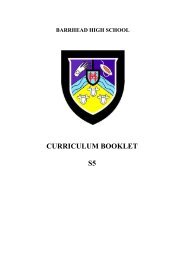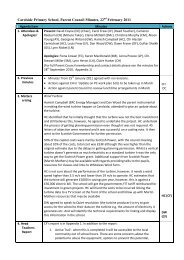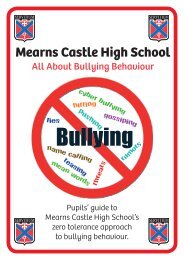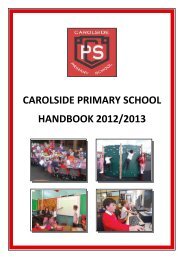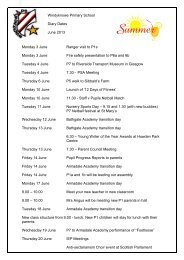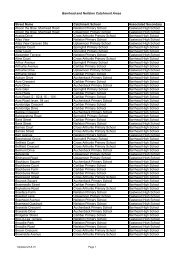Crookfur Handbook 2013 - Central
Crookfur Handbook 2013 - Central
Crookfur Handbook 2013 - Central
Create successful ePaper yourself
Turn your PDF publications into a flip-book with our unique Google optimized e-Paper software.
14<br />
social studies<br />
Through social studies, children<br />
and young people develop their<br />
understanding of the world by learning<br />
about other people and their values.<br />
They also develop their understanding of<br />
their environment and of how it has been<br />
shaped. Children take part in activities to<br />
develop their understanding of history,<br />
geography and modern studies.<br />
We encourage their planning, taking<br />
evidence and recording skills through<br />
these activities.<br />
An important part of our social studies<br />
is visits in the local area and to other<br />
places such as Whitelees Windfarm and<br />
Stirling Castle.<br />
sciences<br />
Science is an important part of our<br />
heritage and we use its applications<br />
every day in our lives at work, at leisure<br />
and in the home. Children take part in<br />
activities to develop their understanding<br />
of science through the living, material<br />
and physical world. They engage in a<br />
wide range of collaborative investigative<br />
tasks, which allows them to develop<br />
important skills to become creative,<br />
inventive and enterprising.<br />
technologies<br />
The technologies curriculum area relates<br />
particularly to contexts that provide<br />
scope for developing technological<br />
skills, knowledge, understanding and<br />
attributes through creative, practical<br />
and work-related activities. Children<br />
take part in research, problem solving,<br />
and exploration of new and unfamiliar<br />
concepts. They are encouraged to develop<br />
their creativity and entrepreneurial skills.<br />
modern languages<br />
French is taught to all pupils following<br />
guidance in Curriculum for Excellence.<br />
We have a number of teachers trained in<br />
the delivery of this area of the curriculum.<br />
The use of modern technology enables<br />
teachers to deliver interactive lessons<br />
which assist pupils with their knowledge<br />
and understanding.<br />
health and<br />
wellbeing<br />
Learning in health and wellbeing ensures<br />
that children and young people develop<br />
the knowledge and understanding, skills,<br />
capabilities and attributes which they<br />
need for mental, emotional, social and<br />
physical wellbeing now and in the future.<br />
Children will experience certain aspects<br />
of health and wellbeing through focused<br />
programmes such as our personal and<br />
social education programmes. There<br />
are times when we will draw on the<br />
expertise of specialists to ensure that<br />
children and young people learn in the<br />
most effective ways.<br />
REDUCING THE RISK OF TRANSMISSION OF<br />
INFECTION<br />
Children who have an infectious disease<br />
should not be at school or nursery.<br />
They should only return after the risk of<br />
spreading infection to others has passed.<br />
It should be noted that certain infections,<br />
if caught by a pregnant member of staff<br />
or parent, can pose a danger to her<br />
unborn baby. You are therefore asked to<br />
notify the school office if your child has<br />
one of the following infections:<br />
German Measles (Rubella)<br />
Chickenpox<br />
Slapped Cheek (Parvovirus)<br />
Measles<br />
Shingles<br />
Thank you for your cooperation



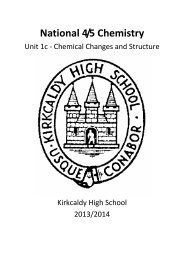
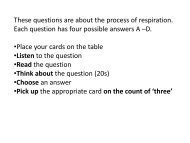
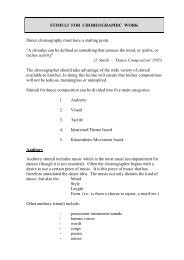
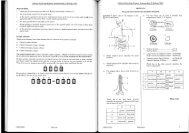
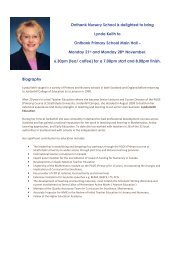
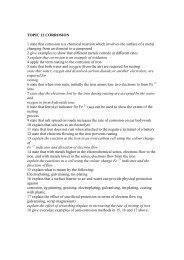
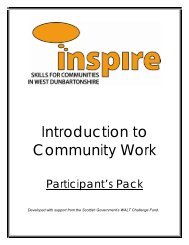
![Eastwood_Area_Catchment_updated_16-5-11[1]](https://img.yumpu.com/17146012/1/184x260/eastwood-area-catchment-updated-16-5-111.jpg?quality=85)
